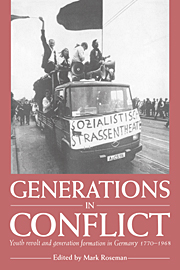Book contents
- Frontmatter
- Contents
- Contributors
- Acknowledgements
- List of abbreviations
- 1 Introduction: generation conflict and German history 1770–1968
- 2 The ideal of youth in late eighteenth-century Germany
- 3 Young Germans and Young Germany: some remarks on the history of German youth in the late eighteenth and in the first half of the nineteenth century
- 4 The battle for the young: mobilising young people in Wilhelmine Germany
- 5 Jewish politics and generational change in Wilhelmine Germany
- 6 The ‘front generation’ and the politics of Weimar Germany
- 7 The New Woman and generation conflict: perceptions of young women's sexual mores in the Weimar Republic
- 8 Generations of German historians: patronage, censorship and the containment of generation conflict 1918–1945
- 9 Gender, generation and politics: young Protestant women in the final years of the Weimar Republic
- 10 The Hitler Youth generation and its role in the two post-war German states
- 11 The BDM generation: a female generation in transition from dictatorship to democracy
- 12 A generation twice betrayed: youth policy in the transition from the Third Reich to the Soviet Zone of Occupation (1945–1946)
- 13 The generation conflict that never was: young labour in the Ruhr mining industry 1945–1957
- 14 The German Kriegskinder: origins and impact of the generation of 1968
- Index
4 - The battle for the young: mobilising young people in Wilhelmine Germany
Published online by Cambridge University Press: 19 October 2009
- Frontmatter
- Contents
- Contributors
- Acknowledgements
- List of abbreviations
- 1 Introduction: generation conflict and German history 1770–1968
- 2 The ideal of youth in late eighteenth-century Germany
- 3 Young Germans and Young Germany: some remarks on the history of German youth in the late eighteenth and in the first half of the nineteenth century
- 4 The battle for the young: mobilising young people in Wilhelmine Germany
- 5 Jewish politics and generational change in Wilhelmine Germany
- 6 The ‘front generation’ and the politics of Weimar Germany
- 7 The New Woman and generation conflict: perceptions of young women's sexual mores in the Weimar Republic
- 8 Generations of German historians: patronage, censorship and the containment of generation conflict 1918–1945
- 9 Gender, generation and politics: young Protestant women in the final years of the Weimar Republic
- 10 The Hitler Youth generation and its role in the two post-war German states
- 11 The BDM generation: a female generation in transition from dictatorship to democracy
- 12 A generation twice betrayed: youth policy in the transition from the Third Reich to the Soviet Zone of Occupation (1945–1946)
- 13 The generation conflict that never was: young labour in the Ruhr mining industry 1945–1957
- 14 The German Kriegskinder: origins and impact of the generation of 1968
- Index
Summary
Over the last few years, historians of twentieth-century Germany have increasingly recognised the importance of generational groupings and divisions in influencing both intellectual climate and political attitudes and conflict. Particularly in the period between the end of the nineteenth century and the Nazi era, tension and conflict between ‘youth’ (however defined) and the established generations came to be as decisive as divisions along socio-economic class lines in shaping Germany's political development.
Though the roots of these generational tensions can undoubtedly be traced further back, it was in the Wilhelmine era that they emerged strongly for the first time. In public debate about the way society saw itself, for example, the concepts of ‘youth’ and ‘young generation’ played a central role. At the same time large numbers of youth organisations, some autonomous, some affiliated to other movements, came into being in these years. There was also a marked increase in educational and social research concerned with young people. Great efforts were made by state and church to win the hearts and minds of the young and integrate them into established society. In short, there was an explosion of concern with, and awareness of, youth that was arguably far more extreme than in other industrialised Western nations.
The aim of the present essay is first, to outline the diverse and often contradictory forms in which these new tensions between youth and adult society emerged and developed in Wilhelmine Germany.At the same time, it analyses why the whole question of youth should have assumed such importance, and attempts to place the Wilhelminian preoccupation with youth in the broader context of a growing feeling of insecurity on the part of the German bourgeoisie.
- Type
- Chapter
- Information
- Generations in ConflictYouth Revolt and Generation Formation in Germany 1770–1968, pp. 92 - 104Publisher: Cambridge University PressPrint publication year: 1995
- 1
- Cited by



